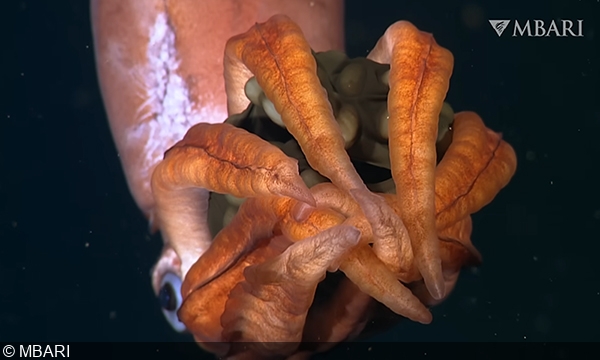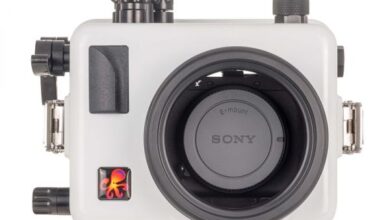Deep sea squid mother with giant egg captured by scientists

Source: MBARI
Scientists at the Monterey Bay Aquarium Research Institute (MBARI) have released a never-before-seen video of a deep-sea squid holding dozens of extremely large eggs. Captured at a depth of 8,419 feet (2,566 meters) by the institute’s advanced underwater robot Dr. Ricketts while an expedition to Mexico’s Gulf of California in 2015, video appeared later a team of researchers from MBARI, GEOMAR’s Helmholtz Kiel Center for Ocean Research, and the University of South Florida conducted a “meticulous review of the ROV footage and examined similarly shaped squid samples collected on previous expeditions to the Gulf of California.”
Although MBARI researchers have previously observed deep-sea squids incubating eggs, this particular sighting was unusual because the eggs were twice as large as those of other deep-sea squids incubating eggs. This is also notable because deep-sea squid often lay thousands of tiny eggs – perhaps up to 3,000 at a time – but this footage shows the mother squid holding only a cluster of about 30 to 40 eggs. Each egg is about 11.6 millimeters, or about half an inch, in diameter, which is nearly double the size of previously observed eggs. gonad ink, no larger than about 6 mm, or about a quarter of an inch.
So why are there so few large eggs? Since the deep sea provides more stable and predictable conditions, it may be more beneficial to devote energy to producing a small number of giant eggs because they have a high chance of survival, as opposed to the environment. environments with limited food availability and/or high predation where it exists. more beneficial to produce a large number of small eggs. This theory is supported by previous findings of other deep-sea molluscs, such as the warty deep-sea octopus and the pearly octopus, both of which were observed with broods Atypical large and small eggs.
MBARI senior scientist Steven Haddock, lead scientist on the expedition to meet the brooding cephalopod, said: “The deep sea is the largest living space on Earth and there is so much yet to be discovered ”. “Our unexpected encounter with a giant incubating squid attracted the attention of everyone in the ship’s control room. This remarkable sight highlights the diversity of ways animals adapt to the unique challenges of living at depth.”
The exceptional rarity of the footage is highlighted by the statistics surrounding MBARI’s exploration effort: Just 17 squid mothers holding eggs have been captured on camera over 37 years of exploration.
Watch the video below and learn more about MBARI’s work This. You can also read a short scientific article detailing the discovery above magazine’s website Ecology.





